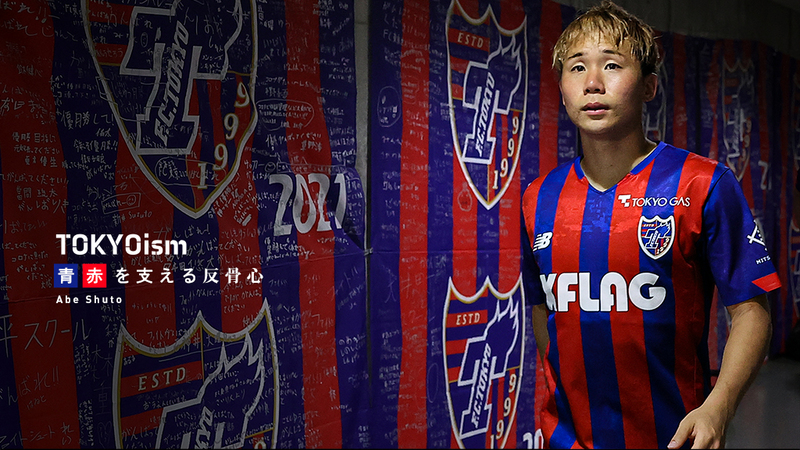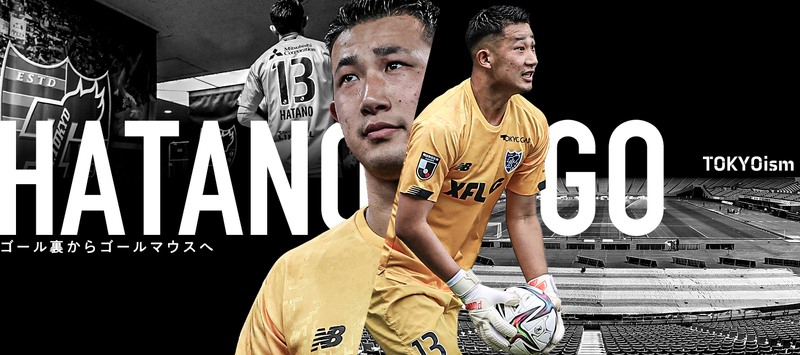There is a saying called "second year jinx".
One trend seen in professional sports and the entertainment industry is that if an athlete has a successful rookie year or has a breakout performance with significantly better results than the previous year, their performance tends to decline the following year.
Shuto ABE may seem to have nothing to do with this jinx at first glance.
In the 2020 season, after joining as a member of the Aka-Ao from Meiji University, he played in 27 league matches and scored 2 goals, but in his second year as a professional, he has already played in 30 matches. Although he has not been able to score, there is also the aspect of his position moving down one row from inside half to defensive midfielder.
What stands out above all is his position within the team. He has taken over as the central midfielder in place of Kento Hashimoto, who left for Russia last summer, and has brought a high intensity to the team. Now, without Abe, "Kenta Tokyo" is almost unthinkable.
However, the person in question was struggling.
Abe was feeling embarrassed about not being able to play as he had imagined and not being able to lead the team to greater heights.
"In my first year, I was able to go all out with a fresh mindset, but this year I've been thinking too much. With Kenjin-kun transferring and having high expectations, I can feel the pressure. I want to live up to those expectations and go all out, but as a defensive midfielder, I have to consider the balance between offense and defense. I have to cover for someone if they make a run, which makes it difficult for me to find the right timing to push forward. On one hand, I can see more things happening on the field, but on the other hand, it's also holding me back..."
Under the guidance of manager Kenta HASEGAWA, I worked on sprint training using tubes this summer to gain even more power. I felt a sense of improvement in my physical condition and increased running ability.
However, halfway through the season, the team has been unable to achieve the desired performance and results, leaving them unable to meet their own expectations.
The news that shook Abe's heart came flying in at that moment.
Life-changing Convert
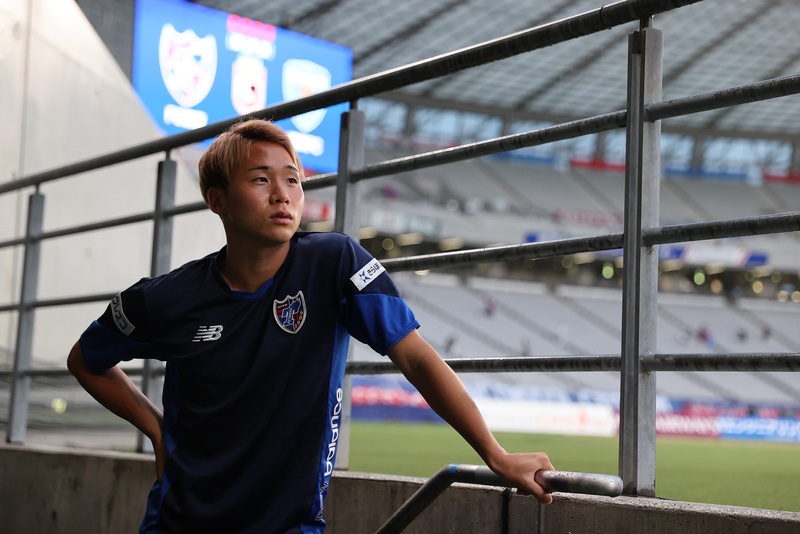
From 1st year of junior high school for 6 years, I was filled with the "Seiakutamashii" at FC Tokyo Academy, and experienced winning the National Athletic Meet as a key player for the Tokyo prefectural team in my 1st year of high school.
Although he did not get promoted to the top, he played an active role as a key player at Meiji University, a prestigious university in the world of college soccer, from his second year. As he entered his final year, he quickly decided to return to his former team. From an outsider's perspective, Abe appears to be a soccer elite.
However, the person has no such awareness at all.
"I was in the lowest position in FC Tokyo U-15 Musashino Selection. In the first place, there were many skilled players who came to take the exam, but I cleared each of the first, second, and third stages and finally passed. I was short and the level of the players around me was high, so at first I was nervous like "Am I going to play with these players?" When I actually joined, there was a time when I thought it might be tough for me."
The turning point came when I was in my second year of junior high school. From attacking midfielder to defensive midfielder - my position was changed.
It was Toshiki KOIKE, who was the coach at the time and is now in the scouting management department, who led ABE to the "new world". As a player, he played as a midfielder and was affectionately known as "Peru KOIKE" by fans and supporters. It is certain that ABE felt a similar quality in himself.
This is what changed Abe's soccer life dramatically.
"I feel like I've grown a lot since being given the opportunity to play in every game from there."
However, promotion to FC Tokyo U-18 was just barely achieved.
In a tough situation where only one of Abe and another person could be promoted, the decision was put on hold for a while. During that time, I took the selection test for the High School Federation as a precaution and passed, but in the end I was able to secure the final ticket.
Abu, who managed to climb one stage, will continue to establish his playing style as a defensive midfielder.
"I think I started playing this style in my first year of high school. I was naturally athletic and had good stamina. But for some reason... I found myself being good at stealing the ball. I don't know how it happened, but before I knew it, this became my playing style."
Not going back to Tokyo
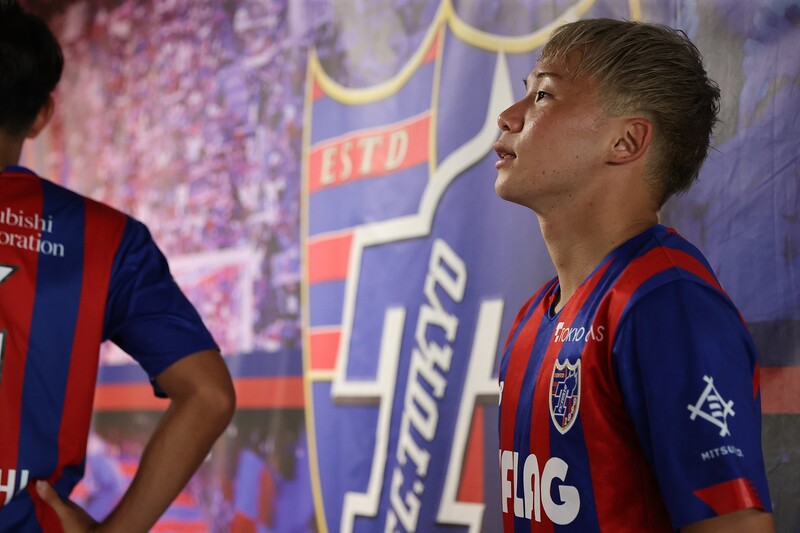
It was around this time that my love for Tokyo and my passion for professional football grew immensely.
The city of Hino, where Abe originally lived, is Verdy's hometown. In fact, when I was in elementary school, I watched many Verdy games at the stadium.
Despite that, the reason I took the selection for FC Tokyo's academy was because "I couldn't seem to like Verdy for some reason". However, as I became a high school student and started practicing at the Kodaira Ground, my admiration for the top team practicing next to us grew stronger.
By this time, I had more opportunities to watch the top team's games.
My heart was filled with excitement as I watched the players on the pitch at Ajinomoto Stadium, illuminated by the cocktail lights.
Abe was a member of FC Tokyo U-18 from 2013 to 2015. This was during the time when Ranko POPOVIC and Massimo FICCADENTI were managing the top team.
I want to play on that pitch too ――.
The player who caught Abe's attention with such strong determination was a slender player who fiercely clung to the opponent and successfully stole the ball.
"Player Takuji Yonemoto. He was shining. It's amazing that he can move like this and also steal the ball. We play in the same position and have a similar play style, so I think I need to use him as a role model."
By increasing my playing opportunities from my second year of high school, I was able to imagine myself standing on the pitch at Ajinomoto Stadium by the time I became a third year. However, something happened――.
"I thought I could make it to the top team, but during the summer interview in my third year of high school, I was told it would be "difficult" and that it was impossible. I was really shocked. The club recommended me to go to university, and asked me about Meiji University. But at that time, I couldn't even think about going to university."
After returning home, Abe talked with his parents and was encouraged by the words "Why don't you do your best in college?" He promised to become a professional in 4 years and changed his mindset.
At the same time, there was another promise made at this time.
Not going back to FC Tokyo.
"At that time, I think I told my parents. I definitely won't go back. I was so frustrated, so I wanted to get back at them."
However, what awaited Abe as he began to walk a new path with rebellious spirit was days of humiliation where he couldn't even make it to the bench.
The number of official games played during my first year of college was only one.
"Honestly, it was more shocking than not being able to get promoted to the top. It was mentally tough for me because I couldn't play in any games throughout the year."
What motivated Abe was the presence of his classmates. He competed with Morishita Ryoya (Nagoya Grampus), Seto Itsuki (Yokohama FC), Nakamura Hotaka, and others who were not involved in official matches, and worked hard in strength training and self-practice until they were recognized.
In addition to the rebellious spirit of wanting to prove himself to FC Tokyo after not being able to promote to the top team, strong feelings of why he wasn't being played and wanting to pave his own path in university drove Abe forward.
"We were all striving together, without rotting, aiming for the top. I truly believe that we were blessed with wonderful environment and great teammates. Thanks to having many passionate peers, we were able to work hard and come this far."
As he gradually gained playing time from his second year of college, FC Tokyo officials started to visit the venue to observe Abe's play in almost every game.
"After the match, I was approached and talked to. It made me really happy to see that even after leaving the club, they still watch me with enthusiasm. It made me start to think that I want to go back to Tokyo."
Whatever the era, Tokyo treasures it.
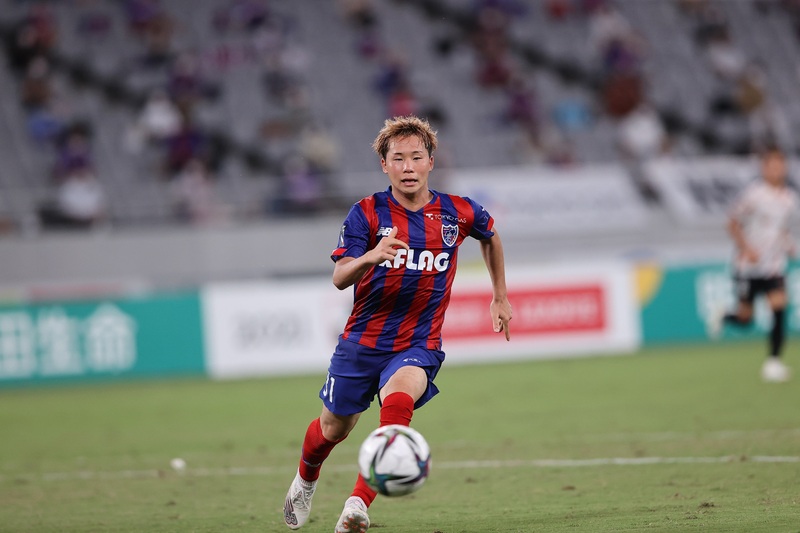
In February 2019, just before advancing to his fourth year, there was an offer from FC Tokyo to acquire Abe, who had become a key player at Meiji University.
Abe carefully keeps the joy of that moment in his heart.
"During the preseason Okinawa camp, I was invited by the scouting management director Yutaka Ishii to go to a cafe with Kazuya Konno. There, he said, 'I want to make an offer.' I thought, 'Is it going to be decided?'"
There is no doubt that the sincerity that was shown to me even after leaving the club has dissolved my rebelliousness of never wanting to return, and has awakened the Tokyo love that I had locked away deep in my heart.
However, the reason for deciding to enter Tokyo was not just that.
"Even the fans and supporters who supported me during my U-18 days came to watch my university games and said 'Come back' to me. That made me happy and I also thought that my playing style and Tokyo's football were a good match. That was one of the reasons why I thought I could succeed in Tokyo."
"Tokyo soccer" does not simply mean the style that Coach Hasegawa aspires to.
The style of soccer varies depending on the coach in charge. However, the underlying Tokyo DNA, which has always been valued and thoroughly instilled in the academy, remains unchanged.
The attitude to fight, the act of running, and never giving up.
That is exactly what was Abe's strength and what he has cherished.
"Coach Kazuki Sato, who was the U-18 coach, was a very passionate person. He always emphasized things like winning the ball, physicality, and transitions in every game, and that really stuck with me. My current strengths are definitely things that I developed during that time."
Abe, who fits into Coach Hasegawa's style, left a great record in his rookie year of the 2020 season. He can be proud of it.
In his second year, he is becoming an irreplaceable presence in the middle of the season. However, for Abe, who had set three goals of becoming the mainstay of the team aiming for the league championship and scoring 5 goals, it is not satisfactory.
Abe himself knows well that the fact that the position has dropped one row is not an excuse for still having no goals.
Now, I am aware of Sho INAGAKI, a senior at FC Tokyo U-15 and Nagoya Grampus. Inagaki missed the promotion to FC Tokyo U-18 and took steps up to Teikyo High School, Nippon Sport Science University, Ventforet Kofu, Sanfrecce Hiroshima, Nagoya Grampus, and eventually became a hardworking player who made it to the Japan national team.
"Even though Inagaki is a defensive midfielder, he has scored 8 goals in the league. I need to improve my mid-range shooting like Inagaki and also work on my partnership with (defensive midfielder) Takuya AOKI and make more runs forward."
The man who knows the world is nothing but a stimulus.
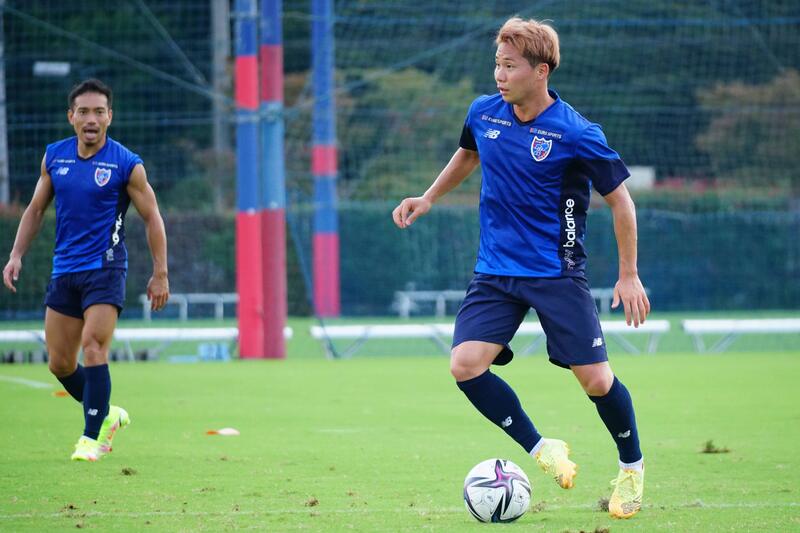
For Abe, who is facing a wall that can only be seen by those who set high goals, Yuto NAGATOMO's return to FC Tokyo holds great significance.
The return of this great senior at this timing could be seen as a gift from the god of soccer to Abe.
Nagatomo, a senior at Meiji University, is undoubtedly a player who knows the top of the world. He is a man of indomitable spirit who has climbed up with a rebellious heart, far surpassing Abe, who is also known for his rebellious spirit.
"There's nothing but stimulation, and I'm constantly learning from everything. During the game, Yuto-kun gives me advice to create a triangle with me and the left side half player, and he scolds me, saying 'Don't lose the second ball no matter what.' There are many things I need to absorb, such as conditioning, and giving voice during the game."
One of the things that surprised Abe the most was his communication skills. Of course, Abe also imagined the high level of "communication power" of his senior who has become a mood maker in any club in Italy, Turkey, and France.
However, it exceeded my imagination.
"Even during practice, he never stops shouting, giving instructions, and encouraging us. He communicates with Brazilian players using English and Italian, and he tells us things that we couldn't understand before. It's really appreciated, or I would say it's an experience."
"Nagatomo, who declares to create a strong Tokyo, clearly pointed out that the team's atmosphere is loose." Abe firmly takes those words to heart.
"It is certain that the atmosphere changed when Yuto-kun joined. It was not necessarily relaxed, but rather tightened. We have become more competitive even on the practice pitch. I think it's thanks to the people who point out things that we are able to notice."
Playing with a man who knows the world, my goals have become clearer and my vision has become more defined.
"I want to be involved with the Japan national team."
Abe had complex feelings this summer. The U-24 Japan national team, which advanced to the best 4 at the Tokyo Olympics, consisted of players from the same generation as Abe, who was born in 1997.
"Honestly, I couldn't watch it properly... I had the feeling that I wanted them to do their best, but also the feeling of frustration, so I ended up having mixed emotions."
Abe, who has now become a presence carrying FC Tokyo, may have a rebellious spirit that he is not losing to them. The youth national team is the last chance for the Olympics. After that, there is only the Japan national team without age restrictions.
Knowing the standards to achieve that goal, the presence of senior colleagues should be significant.
"Many players selected for the Japan national team are either playing overseas or have returned from overseas. In order to break into that group, I think I need to raise my own awareness and aim higher."
No matter what era, we have not always been at the forefront from the start. With frustration in our hearts, we have taken one step at a time and raised the stage.
The daily efforts at the Kodaira Ground are leading to a bright future――.
Believing so, Abe aims for both the title acquisition and joining the Japan national team.
◇Shuto ABE Profile
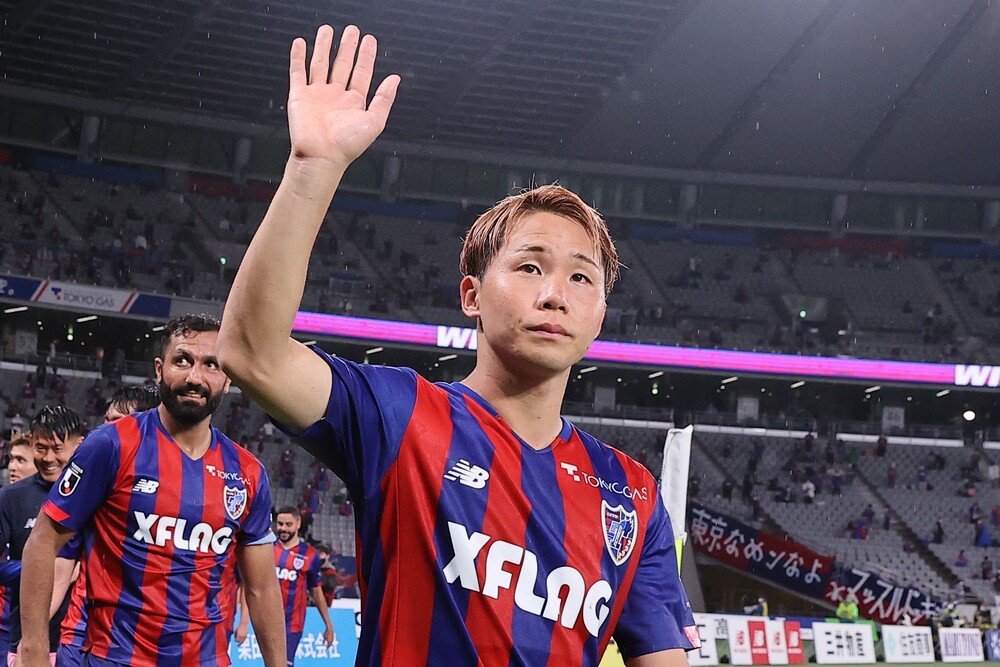
Height/Weight: 171cm/67kg
Hometown: Hino, Tokyo
Career: FC Tokyo U-15 Musashi → FC Tokyo U-18 → Meiji University → FC Tokyo
Text = Atsushi Iio
Text by Atsushi Iio
Photo = Kenichi Arai
Photo by Kenichi Arai
